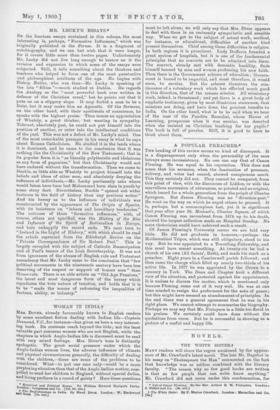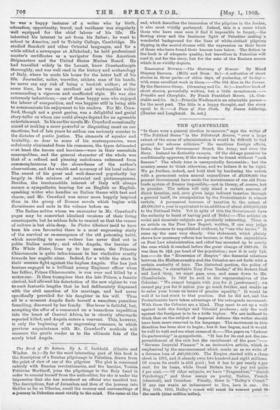NOVELS.
THE WHITE SISTEitt MANY readers will shale the regret awakened by the appear- ance of Mr. Crawford's latest novel. The late Mr. Bagehot in his essay on "Shakespeare the Man" commented on the fact that knowledge was so seldom combined with the literary faculty. "The reason why so few good books are written is that so few people that can write know anything." Mr. Crawford did not come under this condemnation, for • Life of Canon Fleming. By the Bey. Arthur B. M. Pinlayson. London s J. Niebet and Co. [Gs. not.] The Whtte Suter. By F. Marion Crawford. London : Macmillan and Co. Dna he was a happy instance of a writer who by birth, education, opportunity, travel, and residence was singularly well equipped for the chief labour of his life. He inherited his interest in art from his father; he went to school in America, and to Trinity College, Cambridge. He -studied Sanskrit and other Oriental languages, and for a while edited a newspaper at Allahabad ; he held professional master's certificates as a navigator from the American Shipmasters and the United States Marine Board. He had travelled widely in the Levant, knew Constantinople thoroughly, and was well read in the history and archaeology of Italy, where he made his home for the latter half of his life. Journalist, sailor, traveller, athlete, man of his bands, he never ran any risk of being a bookish author; at the same time, he was an excellent and workmanlike writer commanding a vigorous and unaffected style. He was also extremely industrious,—one of those happy men who enjoyed the labour of composition, and was happier still in being able to communicate his enjoyment to his readers. For Mr. Craw- ford, though not a great genius, was a delightful and genial story-teller on whom one could always depend for an agreeable entertainment. In his earlier novels Mr. Crawford occasionally aimed at making a more powerful or disquieting onset on our tmations, but of late years he seldom ran seriously counter to the dictates of poetic justice. The elements of squalor and brutality, so dear to some of his contemporaries, were sedulously eliminated from his romances, the types delineated -;-at least the heroes and heroines—were in their essentials cosmopolitan, and the general character of the whole was that of a refined and pleasing melodrama redeemed from nommonplaxeness by the shrewdness of the author's observations, and. the wealth and accuracy of his local colour. The secret of his great and well-deserved popularity lay largely in this mixture of restraint and picturesqueness. Besides, the inexhaustible interest of Italy will always ensure a sympathetic hearing for an English or English- speaking writer who handles an Italian theme with tact and charm, and Mr. Crawford was never more happily inspired than in the group of Roman novels which begins with Saracinesea and ends in the volume before us.
The Italian nobles whom we encounter in Mr. Crawford's pages may be somewhat idealised versions of their living counterparts, but he seldom fails to remind us that the veneer of culture is but akin-deep. In .Pietro Chieleri (said to have been his own favourite) there is a most engrossing • study of the survival or re-emergence of the old poisoning habit, which according to some writers has never died out in polite Italian society; and while Angela, the heroine of The White Sister, lives up to her name, the Princess Chiaromonte is quite infra-human in her vindictive cruelty towards her angelic niece. Indeed, for a while the stars in their courses fight against the hapless Angela. She has just become engaged to a brilliant young Engineer officer when her father, Prince Chiaromonts, is run over and killed by a motor-car. It then transpires that the late Prince, a fanatic clerical, had allowed his detestation of the new regime to run
to such fantastic lengths that he had deliberately dispensed with the civil sanction of his marriage, and bad never specifically provided for his daughter in his will. Thus
all in a moment Angela finds herself a nameless, penniless foundling, disowned by her family. Her lover is faithful, but,
accepting the offer of a command on a hazardous expedition into the heart of Central Africa, be is shortly afterwards reported killed, and Angela enters a convent. This, however, is only the beginning of an engrossing romance, in which previous acquaintance with Mr. Crawford's methods will reassure the gentle reader as to the ultimate fate of the sorely tried Angela.











































 Previous page
Previous page